President's Message - March 2022
50 Years of OAME!

JUDY MENDAGLIO
judy.mendaglio@oame.on.ca
Because of the circumstances of the past three years, both personal and global, I know that "planning" and "goal setting" may be a fool's errand. The Board of Directors and the Executive Committee of OAME/AOEM have not met face-to-face in two years. Our Leadership Conference has been postponed twice. Our past three annual conferences, having each been planned as face-to-face conferences, have had to be held virtually, adding much more work onto the shoulders of the planning committee members, who were already facing the disappointment and reimagining of a conference they have been planning for three years. In fact, my entire two-year presidency will have allowed for only one face-to-face meeting with our Board of Directors, and I will not have had the chance to attend a live conference either as President-Elect or as President. However, even though planning may be a fool's errand, what we can do, and must do, as we contemplate our future, is hope and dream. So, my first hope is that we will meet face-to-face at our annual conference in May 2023, and that we will feel safe as we sit with each other, unmasked, sharing stories, and even that we feel free to hug long-time friends.
In recent years, we have learned so much and have had so many successes! We have learned how to conduct business meetings, using an online platform, and have successfully transitioned into the digital world to ensure that the business of OAME/AOEM and its committees continues forward. We have learned how to engage students with rich mathematics, despite the necessity of them learning remotely, and have successfully supported teachers in developing new strategies for online and hybrid learning. We have learned how to put on very successful virtual conferences, and have assisted other organizations with planning their own fully online conferences. We have learned how to harness new technologies, and how to reimagine older technologies so that they can be used in new ways. And we have learned innovative ways to support each other when we cannot be together in the same room.
Virtual Executive and Board meetings are an unnatural way to meet people, to talk about the past and the future, and to set priorities. It is extraordinarily difficult to try to set goals and long-range plans, without sitting around a table and talking, mixing moments of social chit-chat with the hard business of leading an organization such as ours. There are always so many inspiring ideas shared, so many perspectives to consider, and so many possibilities to explore. However, time and resources are serious constraints for a volunteer organization such as ours. So, priorities must be carefully set. Our objectives are always guided by our Mission, Vision, and Strategic Priorities, and must always be considered within the larger context of many unique and changing educational environments across the province. What is so wonderful about being on the Board of Directors of OAME/AOEM is that we can talk and listen to each other and learn about what challenges are being faced by mathematics educators in various regions of the province. Each region has its own unique priorities, and each Chapter Representative brings those perspectives to the discussion around the OAME/AOEM table. We recognize at these times that there is no "one right answer" or "one right way" for our organization to support its members. Our members, like our students, are not a homogenous group.
OAME/AOEM, so well known for running successful Spring conferences, met the unique challenges posed by the COVID pandemic. In 2020, members of the Annual Conference Planning Committee and a group of wonderful OAME/AOEM volunteers pulled together as a team to "pivot" (a little-used word in March of 2020) and offer the conference virtually. Of course, we had a bank of experienced helpers because of our e-Conference options, but this was distinctly different. With the OAME/AOEM Virtual Conference of 2020, we saw registrations coming in faster than the virus was spreading, and we had attendees from around the globe visiting our sessions. It was astonishing! From this success, we learned that, while face- to-face conferences are always desirable for those who can attend, the virtual conference provides accessibility to professional learning for a greater number of educators than would have had the opportunity to attend an in-person event.
So, what I hope is that OAME/AOEM will continue to be creative in finding innovative ways to support all members, and indeed, all Ontario math teachers, to engage their students in relevant and rich mathematics. Several years ago, we began making our Gazette and Abacus archives available electronically to members, and our OAME Talks podcasts continue to offer conversations with leaders in mathematics education. We will continue to bring excellent professional learning opportunities in the future,
Historically, OAME/AOEM has always tried to provide reliable and timely responses to new data as it becomes available, as well as to changes in the Ontario math education environment. When it was recognized that girls were underrepresented in Senior mathematics classes, OAME/AOEM took on the goal of achieving gender equity in Senior math classes and of changing existing attitudes about girls and math. That girls didn't study math was thought to be okay by many people—parents and teachers alike. That girls and boys did not participate in equal numbers in the types of scholarship-generating competitive math contests that were available was also thought to be okay. In an effort to support girls in seeing themselves as capable mathematics students, OAME/AOEM designed and created their own math contest, the Ontario Mathematics Olympics (OMO), to provide the opportunity for boys and girls to participate, in equal numbers, as a team.
Since research had shown that girls were more likely to participate in co-operative challenges than competitive ones, the OMO was designed to have several co-operative problem-solving tasks, rather than the traditional pencil-and- paper “no cheating†types of contests that we still see today. Why not, since co-operative efforts are a realistic portrayal of how actual mathematicians, engineers, and scientists work through mathematical problems. The new contest was communicated to the regional chapters, and chapters were invited to send a team to the provincial OMO. While still more needs to be done to achieve gender equity in post- secondary mathematics programs, we are now seeing a more balanced distribution of genders in Senior math classes, and more girls are now indicating that they like mathematics than one would have seen 50 years ago. My wish is that soon everyone who identifies as female will view mathematics as a viable and rewarding field of study. My further wish is that we continue on the path of progress and work to identify and eliminate non-binary gender biases in our mathematics programs, at all levels.
During my time on the Board of Directors, we have worked to build stronger connections with those working in both the English and in the French education systems of this province. We are providing more resources in French for students and teachers in our francophone communities. We are far from where we hope to be one day, but we are proud of the progress we have made, as represented by the number of sessions in French that are being given at our annual conferences, and the increase in the number of articles submitted to our publications from members of our francophone community. We are also privileged to have collaborated with l'Association francophone pour l'enseignement des mathématiques en Ontario (AFEMO) on two large projects over the past two years. For the first time in my teaching career, we now have the same math curriculum in English and in French schools (up to Grade 9), and it is my wish that this provides the opportunity to continue to provide resources in both languages.
Perhaps the biggest change we see as mathematics educators is the much-overdue rebranding of mathematics. For too long, mathematics was perceived as a foreign world, inhabited by odd geeky people, who speak an unintelligible foreign language, and who write in suspicious symbols. It was a place to be visited, if absolutely necessary, but not to be lived in. And that was thought to be okay by many people who would say, "I never use the math I learned in school." It was one of the most common phrases using the word "math" one would hear in the community (along with, "I was never any good at math"). However, it is finally being recognized that proficiency in mathematics is not only desirable, it is a necessity, and that allowing students the option of not being successful in mathematics is an issue of equitable access to future opportunities.
Ours is now a math-filled world, driven by data sets and mathematical modelling. No longer is it acceptable to support the myth that one could only be successful at math if one was born "super smart." Luckily, OAME/AOEM is well positioned to be responsive to this new branding of mathematics. As far back as I can remember, OAME/AOEM has promoted "mathematics for all." Long before Jo Boaler began championing the idea that every child should, and could, become a proficient mathematician, the amazing members of OAME/AOEM were writing resources, giving workshops, submitting articles, and sharing ideas that told of their belief that mathematics, delivered differently, could engage all students in a remarkable world that was only available to those who understood it, and that all students could, indeed, understand mathematics. These educators worked, sometimes tirelessly, usually on their own time for no financial gain, to promote the teaching of mathematics in ways that would allow all students, regardless of gender identification, racial identification, religious identification, special needs, culture, or language, to feel part of that wondrous world. However, we are not there yet.
While we have made so much progress opening up the world of mathematics to our female populations, in recent years, it has become clear to educators that, despite our efforts and best (but sometimes misguided) intentions, we have left many other students outside that world, waiting for an invitation to enter. Our new curriculum challenges us to identify our own biases, as well as biases that may stem from a Western way of thinking about mathematics. Mathematics education research, a relatively new field, continues to inform our work at OAME/AOEM, providing a lens through which we can focus our efforts. As math teachers, we value what data has to tell us, and what data has told us is that our old ways of thinking are no longer the right ways (and indeed may never have been so). We have learned that we need to listen to our students and the communities they come from, rather than to lecture at them. We have learned that we still have much to learn about preparing our youth for their futures, and that assuming that we already know what is best, however well intentioned, may be harming some of our students. We have learned that changing Sam to Susan or Aliyah in a word problem does not make students feel that they are being included. My hope is that we continue on the right track, heading in the right direction, using our vision of equity and inclusivity for all mathematics students to guide us, and our efforts will mean that we will soon see a rise in success rates in mathematics for all students. My wish is that soon, we will routinely hear adults say that they rely every day on the mathematics they learned at school. My wish is that our children will use mathematics to heal the planet, and that they will use mathematics, data, and technology to make the best decisions possible.
The OAME/AOEM map going forward is not in my hands. It is in the hands of our current and future members and our Board of Directors. Our ship will be steered by future Presidents, whose job it will be to navigate the waters of change so that everyone arrives safely at their destination. Our navigation system will continue to be provided by our Mission, Vision, and Strategic Priorities as well as by our current and future Position Papers. The past 50 years have been a time of unprecedented change and growth of knowledge, and OAME/AOEM has always been there, at the ready, to interpret the change and provide resources and supports for our mathematics education communities. Based on the past 50 years, I'd say that we are in very good hands, and that we have every reason to believe that our hopes and dreams can come true.
Previous Message:
The Beauty of Mathematics
Next Message:
Judy's June Message

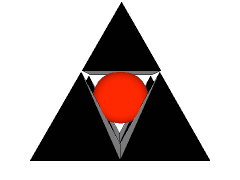








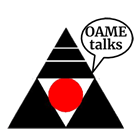
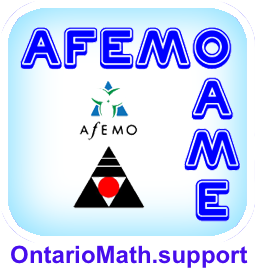
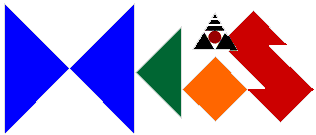



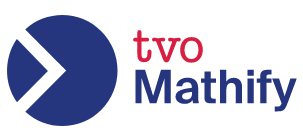

 Like us on FaceBook
Like us on FaceBook